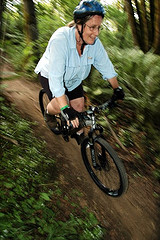Off-road bicycling advocates in the Portland area have two major reasons to throw their weight behind Metro’s parks and natural areas levy: Agency Creek and McCarthy Creek. Both parcels are called out by name in the text of Measure 26-152 as having potential for single track mountain biking.
The levy, up for a vote on May 21st, seeks to raise $50 million over five years to help Metro maintain and improve thousands of acres in natural areas and parks they’ve purchased over the years.
The Northwest Trail Alliance, a Portland-based non-profit that maintains, builds and advocates for mountain bike trails, is urging their members to support the levy. They see the Agency Creek and McCarthy Creek parcels as places where a mountain bike trail system could be built. And because they are outside of the northern border of Forest Park, bike access could be developed without any of the political baggage or controversy that has surrounded attempts at creating single track opportunities in Forest Park (which is owned and managed by the City of Portland).
The parcels are a few hundred acres of land that are currently a mix of forests and tree farms situated north of McNamee Road and bordered by Skyline Blvd. They’re also just nine miles from northwest Portland, a distance that would make them easily by bike for city residents.
Measure 26-152 doesn’t automatically open up these parcels for mountain biking. Rather, if passed, it would allow Metro to fund studies to further consider their development as biking areas. Here’s the official language in the Metro resolution:
“Various parcels near to but outside of Forest Park are currently or could be used by walkers or cyclists to access nature close to Portland. Access to the site is challenging and there may be opportunities to enhance use. Over the past decade the demand for single track mountain biking trails has increased. This project would explore the potential to provide quality cycling and hiking experiences for formal single track cycling and walking trails, and as appropriate, construct the facilities.”
Tom Archer, the former advocacy director for the Northwest Trail Alliance who represented the group during the debate over mountain biking in Forest Park, is familiar with the areas in the Metro levy. He said in an interview last week that, “It’s got some real potential.”
NW Trail Alliance President Jon Pheanis agrees. “From our standpoint, these two parcels do have a lot of potential for mountain biking.” Pheanis is excited about the possibilities, but he’s “tempering optimism” because he knows even if the levy passes, there would be a public and planning process to wade through. “Everyone in town is frustrated with not having any local single track access,” says Pheanis, “And this would be a good site and would take some pressure off of Forest Park.”
If the levy passes, Metro would likely partner with the NW Trail Alliance to develop the parcels in much the same way Oregon State Parks, Portland Parks & Recreation and other agencies have worked with the group on successful projects like Stub Stewart State Park, the Ventura Park Pump Track, and others throughout the region.
In addition to moving forward on new mountain bike trails, the Metro levy would also fund improvements and enhancements on major bike paths like the Trolley Trail, the Springwater Corridor, the Fanno Creek Trail, and so on. Groups like the NW Trail Alliance and the Bicycle Transportation Alliance are also supportive of this measure because it includes an extension of the “Nature in Neighborhoods” grant program. That program would provide $750,000 per year (for five years) to non-profits and other organizations to “implement the regional trails plan.”
Learn more about the levy in your voter’s pamphlet or via Metro’s website. And be sure to vote by May 21st.


